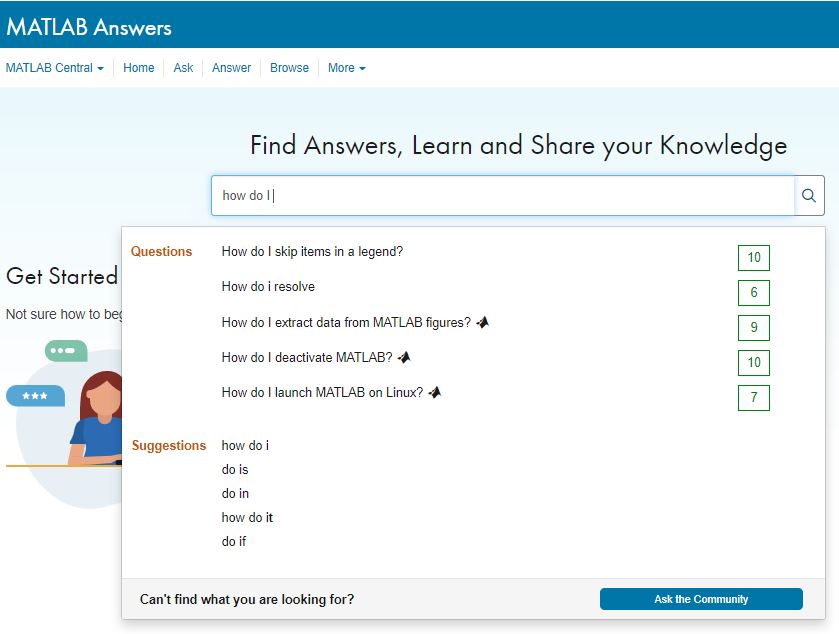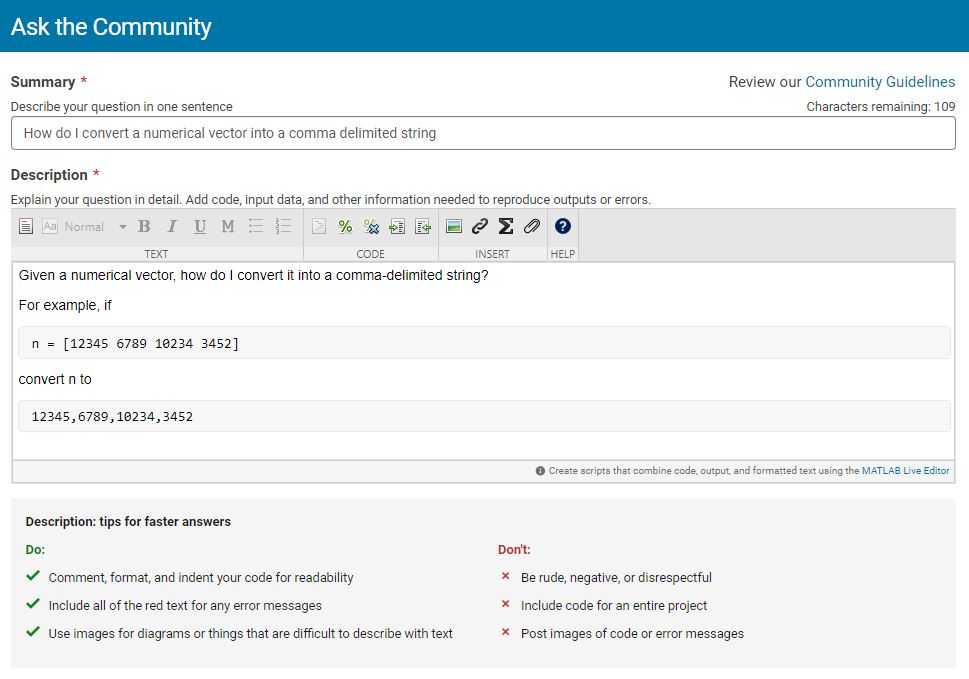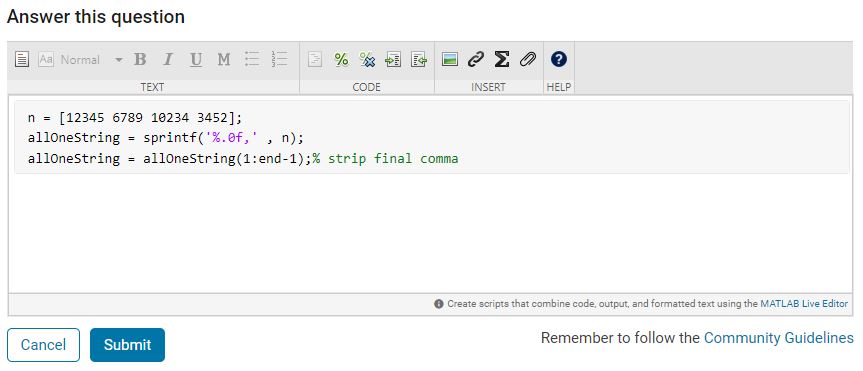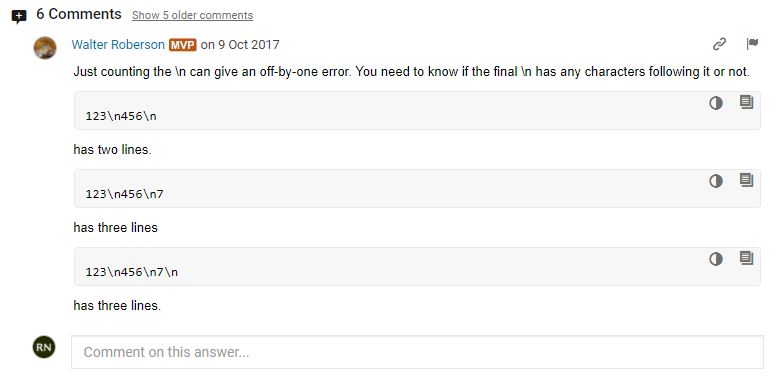About MATLAB Answers
MATLAB Answers™ provides a collaborative environment for finding the best answers to your questions about MATLAB, Simulink, and related products. You can tap into the knowledge and experience of over 100,000 MATLAB Central members and MathWorks employees. Specifically, you can:
- Search for answers to programming questions
- Ask a question and select the best answer
- Answer a question
- Add comments to questions and answers
- Add attachments, images or links to questions and answers
- Add a flag to improve content
- Boost your acceptance rate by accepting answers
- Vote up the best answers
- Build your reputation by contributing questions and answers
- Become a top contributor by achieving Most Valuable Participant (MVP) or Rising Star status
- Earn privileges based on total reputation points
- Perform tasks on questions, comments, and answers based on your privileges
- Earn badges
Your use of MATLAB Answers is subject to the MATLAB Central Terms of Use.
Search for Questions and Answers
Before you ask a question, search to see if the question already exists or has been answered. You can use filters to refine your search. You can filter by status (answered, answer accepted, or unanswered), category, product, or date asked.
You can also use tags or search directives. All questions are tagged with one or more keywords to help community members find questions and answers of interest.
When searching for an answer, select the best answer based on usefulness and votes, which help indicate quality.
Using Tags
Tags provide bookmark information to help find or recall content. You are required to enter at least one tag when you ask a question. With tags, you can browse using assigned keywords. All tags are public; anyone can view them.
Using Search Directives
Search directives help you find content on MATLAB Answers. You can specify search directives in the search box or as edits you make to the URL.
| Content Result | Directive | Examples |
|---|---|---|
| Content with this tag | tag: | |
| Content asked, answered, or commented by this contributor | contributor: | |
| Content asked by this contributor | asked_by: | |
| Content answered by this contributor | answered_by: |
|
| Content commented by this contributor | commented_by: | |
| Content asked within last 7 or 30 days | asked_at: | |
| Questions based on this status: accepted, answered, or unanswered | status: | |
| Contributors with a public profile in which the Company/Organization field contains this string | organization: | |
| Answers that include this string | answer: | |
| Comments that include this string | comment: | |
| Questions that include this string | question: | |
| Titles that include this string | title: | |
| Content with this category name | category: | |
| Content related to this product | product_base_code: |
Relevance and search results
Search directives can lead you to the right questions and answers quickly. If you use keywords in your search, results are sorted by relevance. Otherwise, results are sorted by date updated.
What factors influences relevance?
Multiple factors affect relevance, including:
- The title of a question—make titles as descriptive as possible to optimize relevance.
- Tags associated with a question—make tags as descriptive as possible to optimize relevance.
- Products associated with a question.
- Whether the question has an accepted answer.
- The number of answers the question received.
- The number of votes the question received.
Tips for Using Directives
- To search for a multi-word phrase, enclose the phrase in quotation marks; for example,
author:"Helen Chen". - To narrow search results, use combinations of directives in the same search. Be sure to include a space between each directive. MATLAB Answers finds content matching all specified directives.
- To search for more than one value for the same directive, specify one directive for each value. For example, the syntax
tag:graphics tag:vectorsfinds all files tagged with bothgraphicsandvectors. - To exclude files from your search results, insert a minus sign (-) before the directive syntax. For example, the syntax
-tag:gameexcludes all files with the taggame.
Ask a Question
Before submitting a question, search to make sure it doesn't already exist.

If your search did not provide an answer to your specific question, go ahead and ask it. The community is very responsive, so check back soon for answers.

Tips for Asking a Good Question
- Write descriptive questions that are specific and brief; for example,
How can I change the line color of a graph using plot? - Cite the error number in the title when applicable.
- Include enough code to reproduce your problem exactly.
- Share steps that did not solve your problem.
- Indicate add-on products used, such as toolboxes or blocksets.
- Avoid words that clutter content, such as
hi,urgent,help,thanks, andI’m new. - Limit each question to only one issue.
Answer a Question
Provide meaningful and descriptive answers to questions. If you are unable to answer a question because it is not clear, add a comment to the question requesting clarity or more detail. Please note: 15 or more reputation points are required to answer MathWorks Support Team authored questions.

Tips for Creating Helpful Answers
- Read the entire body of the question before answering; do not base your answer on only the title.
- Add a comment to request clarity for an answer.
- For new questions that were asked and answered before, link to the existing answer from the new question.
- Be honest and considerate with all responses to all contributors.
Add a Comment
Use comments to communicate with other participants about questions, answers, or comments. You can use comments to thank other contributors for answers to your questions or helpful comments. Please note: one cannot comment on questions authored by the MathWorks Support Team, and 15 or more reputation points are required to comment on answers to MathWorks Support Team authored questions.

Tips for Making Comments Helpful
- Use comments to request clarity on a question, answer, or comment.
- Write comments that are relevant and brief.
- Be honest and considerate with all responses to all contributors.
- Be aware that responses containing profanity, vulgarity, or an offensive tone will be removed.
Add a Flag
A flag is a request for review that any contributor can assign to content. Contributors with sufficient privileges can then review and potentially revise, close, or delete the flagged content.
Questions, answers, and comments can be flagged if unclear, not appropriate, or spam.
Contributors with sufficient privileges are encouraged to improve the record or remove the flag (when the flag itself is inappropriate). The nature of the flag helps determine the action needed. This process helps improve the overall quality of MATLAB Answers. MATLAB Central administrators monitor the flagged content page regularly.
Boost Your Acceptance Rate
When someone provides a great answer to one of your questions, accept it to let that person know that you are happy with that answer.
MATLAB Answers keeps track of whether your questions have accepted answers and displays your Acceptance Rate on your home page. An Acceptance Rate of 100% means that you accepted at least one answer for every question you asked. If your Acceptance Rate is below 100%, take a look at your questions and see if any of them have wonderful answers that you want to accept. If you have not received any acceptable answers to a question, consider clarifying or adjusting the question to help others find an answer.
Note: If you accidentally accept an answer for a question or you accept an answer and later find a different answer is better, you can unaccept an answer. Until you accept a new answer, your Acceptance Rate will go back to what it was before you accepted an answer for this question.
Earn Privileges
As you earn reputation points on MATLAB Answers, you also earn the ability to perform more significant tasks. You can check your profile page to view the reputation points and associated privileges you’ve earned. From this page, you can also check the points required for the next level of privileges. Note that administrators managing the system and editors with previously earned reputations have all privileges.
Editing and deleting questions, answers, and comments requires a high number of reputation points, as shown below. The objective of editing is very simple; make content clear, specific, and short. Good questions lead to good answers and result in a searchable archive with lasting value.
Note: Contributors who have earned sufficient privileges may edit and delete questions, answers, and comments at their discretion. This includes removal of personal attacks, spam, and inappropriate or off-topic content, and unaccepting answers. If you unaccept an answer, there is no loss in points.
| Reputation Points Required | Privilege Earned | Usage Notes |
|---|---|---|
| 3000 | Delete questions, answers, and comments. | Delete content with care. Deletions are permanent; you cannot undo them. Once deleted, new activity is prohibited and content is removed from search results. Candidates for deletions include:
You cannot delete your own questions if they received answers. |
| 2000 | Edit questions, answers, and comments. | Edit to address:
Optionally edit as follows for improved community usage:
|
| 2000 | Move answers and comments. | Answers and comments can be moved within a question thread. During a move, the content's Original Poster (OP) and time created is preserved and the OP's reputation is unchanged. After a move, any reputation earned is awarded to the content's OP. You can perform these moves:
Moves are not allowed to or from spam content. |
| 1500 | Open locked or closed questions. | Opening a locked question removes activity limitations from the question thread. Opening a closed question removes activity limitations from the question thread and restores it to search results. |
| 1500 | Lock or close questions. |
Locking a question temporarily limits thread activity to voting and flagging only. Closing a question temporarily limits thread activity and removes it from search results. The original poster is able to delete the question if there are no answers. |
| 1500 | Delete flags from questions. | No specific usage notes apply at this time. |
| 500 | Accept answers to questions. | Answers can only be accepted by someone other than the author of the question after 7 days of inactivity from the author. |
| 50 | Delete tags and products from questions. | This privilege deletes the tag or product from the question but not from the community.
|
| 5 | Add and edit tags and products for questions. | When adding tags and products:
|
Building a Reputation
As a reward for contributing great questions and answers, you earn points. The number of points you earn depends on the action taken. The more points you earn, the greater your reputation—with the bragging rights to match.
| When a contributor… | You earn… |
|---|---|
| Accepts your answer | 4 points |
| Votes up your answer | 2 points |
| Votes up your question | 1 point |
Top Contributors
Your contributions to the MathWorks online community can provide a valuable resource to other community members. Have your expertise recognized with a status that identifies you as a trusted and reliable contributor.
NOTE: The Rising Star status is updated monthly on the first of the month.
| Status | Reached When… |
|---|---|
| Most Valuable Participant |
You earn 5,000+ reputation points. |
| Editor |
You earn 3,000+ reputation points. |
| Rising Star |
You have a minimum average of 4 accepted answers per month for 3 months. This status belongs to you as long as you maintain an average of at least 2 accepted answers per month, or until you reach Editor status with a reputation of 3,000+ points. |
| User Level 10 |
You earn 25,000 reputation points. |
| User Level 9 |
You earn 10,000 reputation points. |
| User Level 8 |
You earn 5,000 reputation points. |
| User Level 7 |
You earn 3,000 reputation points. |
| User Level 6 |
You earn 1,500 reputation points. |
| User Level 5 |
You earn 500 reputation points. |
| User Level 4 |
You earn 150 reputation points. |
| User Level 3 |
You earn 50 reputation points. |
| User Level 2 |
You earn 15 reputation points. |
| User Level 1 |
You earn 5 reputation points. |
Earn Badges
In addition to building and gaining privileges, you can also earn badges as you participate in MATLAB Answers. Any badges you earn appear on your community profile page.
Some examples of badges you can earn are:
- First Answer
- Most Accepted
- Knowledgeable
- Streak
- ... and many more
Visit the community badges page to view the types of badges you can earn.
